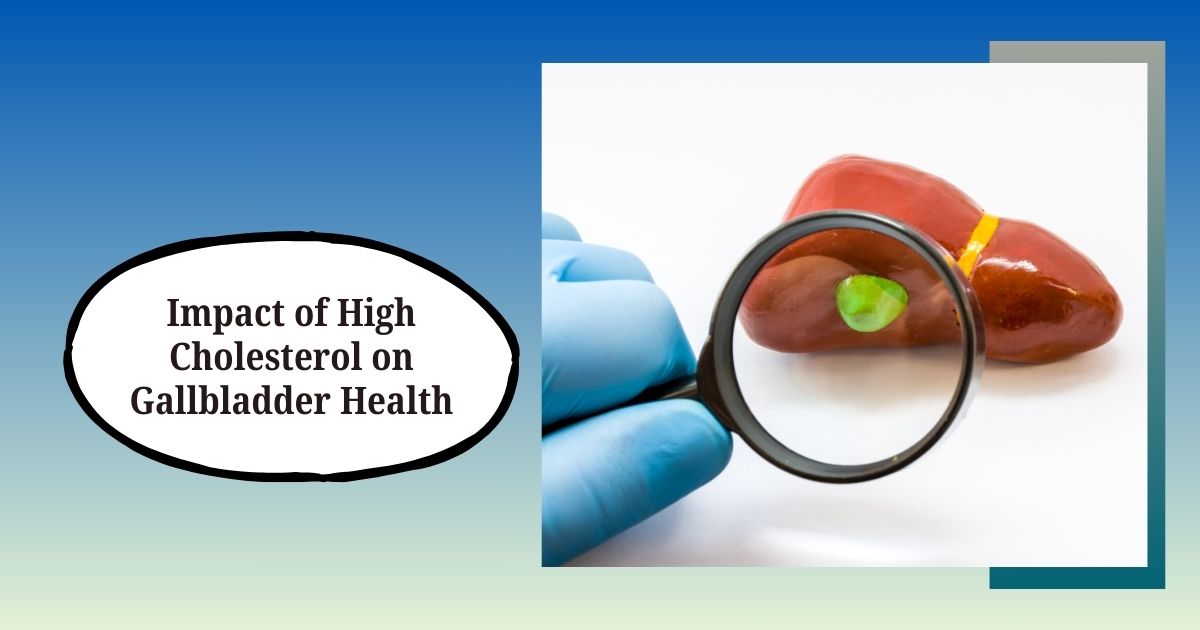The Impact of High Cholesterol on Gallbladder Health
The effects of cholesterol are frequently mentioned in connection to heart health. The effects they have actually go much beyond the cardiovascular system. The gallbladder is one organ where elevated cholesterol levels may directly impact it. Bile, a substance produced by the liver and required for the breakdown of fats, is stored and released by the gallbladder. Excessive cholesterol can cause problems like gallstones and other gallbladder disorders by interfering with the gallbladder’s natural function. We will examine the connection between gallbladder health and high cholesterol in this blog post.
Function of Gallbladder
Gallbladder is a little organ under the liver. The function of the gallbladder is to store the bile that the liver produces. The gallbladder releases bile into the small intestine when you ingest fatty foods, aiding in the breakdown of fats for absorption. Water, bile salts, cholesterol, and other compounds are the components of bile. The gallbladder needs a healthy balance of these elements in order to operate properly.
But an excess of cholesterol in the bile throws the balance off. This can result in gallstones and other problems that can harm the health of the gallbladder.
How High Cholesterol Affects the Gallbladder
-
Formation of Gallstones
Cholesterol gallstones are one of the most frequent problems linked to elevated cholesterol levels. When there is an excess of cholesterol in the bile and not enough bile salts to break it down, these stones form. The extra cholesterol in the gallbladder crystallizes and hardens, generating what is known as Cholesterol stone types of gallstones.
The size and quantity of these cholesterol gallstones can vary. Although some may not show any symptoms, others may obstruct the bile ducts and cause excruciating pain, swelling, or even infection.
-
Gallbladder Dysfunction
High cholesterol can also hamper the normal process of bile emptying by the gallbladder. Excess cholesterol can thicken bile and make it more difficult for the gallbladder to pass it into the small intestine. This may result in gallbladder dysfunction, a disorder that causes pain and digestive problems when the gallbladder doesn’t empty properly and completely.
-
Increased Risk of Inflammation and Infection
The medical illness known as “Cholecystitis” can occur when the bile ducts are blocked by gallstones or by thicker bile, causing inflammation. In extreme conditions, this may result in gallbladder rupture or infection, both of which need emergency surgical treatment.
Risk Factors for Gallbladder Issues Due to High Cholesterol
Several factors can increase the likelihood of gallbladder issues related to high cholesterol:
- Poor Diet: Diets high in fats from saturated sources and deficient in fiber, raise cholesterol level and increases the incidence of gallstones.
- Obesity: Becoming overweight or obese raises cholesterol and increases the risk of gallstones.
- Sedentary Lifestyle: Gallbladder malfunction and elevated cholesterol can be caused by a sedentary lifestyle.
- Genetics: Certain people may have a hereditary predisposition to gallbladder problems as well as high cholesterol.
Maintaining Gallbladder Health by Managing Cholesterol
-
Adopt a Heart-Healthy Diet
- Including foods high in fiber, such as fruits, green leafy vegetables, and whole grains, in your diet can help control cholesterol and stop gallstones from forming.
- Lowering consumption of processed foods, red meats, dairy products, and saturated fats and trans fats can also help control cholesterol levels.
-
Regular Physical Activity
- Regular exercise can help decrease cholesterol level and improve the health of the gallbladder. Mobility is the key. Do some moderate activity for an hour a day for at least 4 days a week.
-
Maintain a Healthy Weight
A healthy body weight can be achieved and maintained by food and exercise. Sustaining this can reduce your risk of gallbladder problems and excessive cholesterol. Never do anything that can cause quick weight reduction as this may elevate the danger of gallstone development.
-
Consult Your Doctor
It is critical to get routine medical examinations and check-ups done and keep an eye on your cholesterol levels. In order to avoid complications, your doctor can suggest medication or other treatments if you have a history of gallbladder problems or high cholesterol.
The health of the gallbladder may be greatly impacted by high cholesterol, which can cause gallstones to develop, gallbladder malfunction, and an elevated risk of inflammation. You can lower your chance of gallbladder-related problems by controlling your cholesterol with a nutritious diet, frequent exercise, and ideal body weight maintenance. For an accurate diagnosis and course of treatment, it is critical to speak to your doctor if you have high cholesterol or gallbladder issues.

